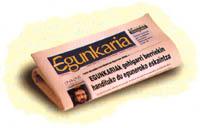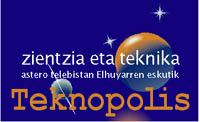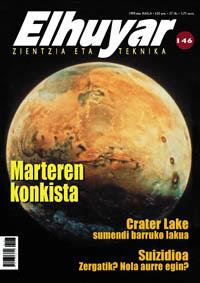Professional divulgation

A few years ago, at least, in Euskal Herria we were few people who wrote with some assiduity about science. Writers and literary critics did not take us into account, did they attend to us now?, we were neither writers nor writers. At the other end of those who have a profession of writing, journalists looked at us as rare animals. The oblivion of the magazine Elhuyar when mentioning the press in Basque was very common. Therefore, neither as a writer nor a journalist, as I erased pages in front of the computer, did I think to give a name to what I did: the letter editor, which has then been used by others.
On the other hand, the media of our environment hardly informed about science and technology. Likewise, when scientific information was given, it had a rather negative tone. I have always believed that the mass media have a vital role in spreading information about science and technology. Consequently, with the aim of changing the situation described above, we have been for years as missionaries. I do not think I have lost the opportunity to vindicate the need for scientific dissemination through the mass media. In fact, the mass media are the main transmitters of cultural models and of knowledge in the current modern technological society, also in the field of science and technology. This is not my invention, look at what Dorothy Nelkin says in her book Selling Science.

For most people, the reality of science is what they read in the press. People understand science not based on school knowledge or direct experience, passing through the filter of language and journalistic representations. The mass media is the main source of information on a scientific-technical field that is rapidly evolving and the consequences that these changes will have in their lives. The ability of people to better evaluate the issues of scientific policy and so that everyone can make their own reasonable options can give good news. The inadequate revelation, on the other hand, allows to deceive and incapacitate people who suffer more and more the impact of science and technology and decisions based on technical capacity.

Nelkin alludes to the good “news delivery”, which I would add directly and understandably. Gross scientific information can be quite difficult, incomprehensible and dry. To reach the public this information must become "absorbent" without losing correction or rigour. This is the work of the scientific journalist. In Euskal Herria there will be one or more journalists from Elhuyar who write about science: at least one in Basque. In that we have a great challenge. We have to train professionals to properly inform about science, since they will not be created as mushrooms. We should encourage young people of scientific training to see their professional future in the dissemination of science, since in the medium term there can be a massive labor stock if the interest that the mass media with science in this field is reinforced lately.
That is why we have created a scholarship to train scientific journalists. Through it, we offer a young scientist the possibility of learning how scientific journalism is carried out by integrating it into the communication team of our Association. In it, immersed in daily work, he will work in most sections of the dissemination: written and audiovisual press. I have no doubt that we will achieve a satisfactory result.
In any case, I will continue to be a marathon runner, since the progress of science is not interrupted, but by increasing travel companions will help me with the heat of the group





